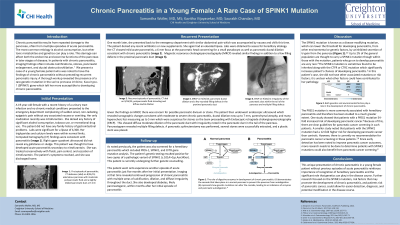Monday Poster Session
Category: Biliary/Pancreas
P1816 - Chronic Pancreatitis in a Young Female: A Rare Case of SPINK1 Mutation
Monday, October 28, 2024
10:30 AM - 4:00 PM ET
Location: Exhibit Hall E

Has Audio

Samantha Woller, MD, MS
CHI Health Creighton University Medical Center
Omaha, WI
Presenting Author(s)
Samantha Woller, MD, MS1, Saurabh Chandan, MD2, Kavitha Vijayasekar, MD2
1CHI Health Creighton University Medical Center, Omaha, WI; 2CHI Health Creighton University Medical Center, Omaha, NE
Introduction: Chronic pancreatitis results from repeated damage to the pancreas, often from alcohol, but other toxins and genetics can play a role. We present a case of a young female patient with chronic pancreatitis without proceeding recurrent injury. A thorough workup revealed the presence of a rare mutation in the serine protease inhibitor, Kazal type-1 (SPINK1) gene, which left her more susceptible to developing chronic pancreatitis.
Case Description/Methods: Patient is a 19-year-old female with no past medical history who presented with epigastric pain. Patient denied any substance use or personal/family history of gastrointestinal issues. She had an elevated lipase and imaging revealed an edematous pancreas, peripancreatic fluid, and a slightly dilated pancreatic duct. Her gallbladder, triglycerides and calcium levels were normal. It was thought that she developed acute pancreatitis due to nitrofurantoin use after a recent urinary tract infection. Her symptoms resolved with conservative treatment and cessation of nitrofurantoin.
She presented one month later with similar symptoms, this time without recent antibiotic use. She again had an elevated lipase. CT showed mild acute pancreatitis with ductal dilation and a small focus concerning for a pseudocyst. MRCP was negative for structural abnormalities. EUS revealed changes consistent with moderate to severe chronic pancreatitis along with findings suggestive of pancreatic stones, but there was no pathology in the common bile duct or gall bladder. ERCP showed dilation of the pancreatic duct with irregularity noted in the tail of the pancreas. Pancreatogram confirmed a filling defect, and the stones were successfully extracted. With no clear explanation for this patient’s chronic pancreatitis, she was screened for genetic mutations which revealed two copies of a pathologic variant of the SPINK1 gene.
Discussion: This case demonstrates the importance of recognition of hereditary pancreatitis and the significant role that genetics can play. The SPINK1 mutation can lower the threshold for developing pancreatitis and can be inherited along with the CTFR or CTRC mutations, increasing the patient’s chances of developing pancreatitis. However, this was not the case for our patient and it remains unclear what other factors contributed to her pathology. Further research on hereditary pancreatitis could allow for better recognition and diagnosis, modification of the disease course, and for development of clear genetic and pancreatic cancer screening guidelines.
Disclosures:
Samantha Woller, MD, MS1, Saurabh Chandan, MD2, Kavitha Vijayasekar, MD2. P1816 - Chronic Pancreatitis in a Young Female: A Rare Case of SPINK1 Mutation, ACG 2024 Annual Scientific Meeting Abstracts. Philadelphia, PA: American College of Gastroenterology.
1CHI Health Creighton University Medical Center, Omaha, WI; 2CHI Health Creighton University Medical Center, Omaha, NE
Introduction: Chronic pancreatitis results from repeated damage to the pancreas, often from alcohol, but other toxins and genetics can play a role. We present a case of a young female patient with chronic pancreatitis without proceeding recurrent injury. A thorough workup revealed the presence of a rare mutation in the serine protease inhibitor, Kazal type-1 (SPINK1) gene, which left her more susceptible to developing chronic pancreatitis.
Case Description/Methods: Patient is a 19-year-old female with no past medical history who presented with epigastric pain. Patient denied any substance use or personal/family history of gastrointestinal issues. She had an elevated lipase and imaging revealed an edematous pancreas, peripancreatic fluid, and a slightly dilated pancreatic duct. Her gallbladder, triglycerides and calcium levels were normal. It was thought that she developed acute pancreatitis due to nitrofurantoin use after a recent urinary tract infection. Her symptoms resolved with conservative treatment and cessation of nitrofurantoin.
She presented one month later with similar symptoms, this time without recent antibiotic use. She again had an elevated lipase. CT showed mild acute pancreatitis with ductal dilation and a small focus concerning for a pseudocyst. MRCP was negative for structural abnormalities. EUS revealed changes consistent with moderate to severe chronic pancreatitis along with findings suggestive of pancreatic stones, but there was no pathology in the common bile duct or gall bladder. ERCP showed dilation of the pancreatic duct with irregularity noted in the tail of the pancreas. Pancreatogram confirmed a filling defect, and the stones were successfully extracted. With no clear explanation for this patient’s chronic pancreatitis, she was screened for genetic mutations which revealed two copies of a pathologic variant of the SPINK1 gene.
Discussion: This case demonstrates the importance of recognition of hereditary pancreatitis and the significant role that genetics can play. The SPINK1 mutation can lower the threshold for developing pancreatitis and can be inherited along with the CTFR or CTRC mutations, increasing the patient’s chances of developing pancreatitis. However, this was not the case for our patient and it remains unclear what other factors contributed to her pathology. Further research on hereditary pancreatitis could allow for better recognition and diagnosis, modification of the disease course, and for development of clear genetic and pancreatic cancer screening guidelines.
Disclosures:
Samantha Woller indicated no relevant financial relationships.
Saurabh Chandan indicated no relevant financial relationships.
Kavitha Vijayasekar indicated no relevant financial relationships.
Samantha Woller, MD, MS1, Saurabh Chandan, MD2, Kavitha Vijayasekar, MD2. P1816 - Chronic Pancreatitis in a Young Female: A Rare Case of SPINK1 Mutation, ACG 2024 Annual Scientific Meeting Abstracts. Philadelphia, PA: American College of Gastroenterology.
